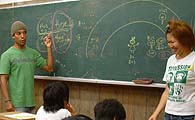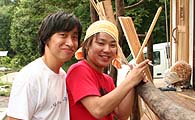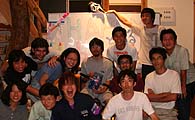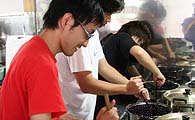|
| |
LAMP (Long And Middle term voluntary Program) |
|
When and Where are volunteers needed ? |
|
|
|
|
|
Other then the following programs, we may organize more projects later, please contact us for more information.
W: Type of voluntary work
S: Study theme
A: Accommodation
L: Location
Q: Special Qualifications
T: Terminal (nearest airport)
* Number of volunteers = the number the host organization need for the same period of time. |
 |
|
NICE/LM 01 Shintoku (Hokkaido) CONS /AGRI/ MENT 2 vols.
From March, June, Sep, for 3 months |
|
The host organization, Kyodo Gakusha Shintoku farm, is a cooperative community which hosts people from a variety of backgrounds such as mentally disadvantaged persons who are are tired of city life and want to learn how to farm or explore a different style of living. They have five communities located in Tokyo, Nagano and Hokkaido. They raise animals, grow vegetables and make cheese using ecological and organic methods. Their cheese has won the 1st prize in the national contest! They are hoping to build new houses for residents this year.
W: Constructing houses (making basement, constructing frameworks, etc.), various agricultural work (planting, weeding, cultivating, harvesting vegetables, caring for animals), etc...
S: Please bring some information about similar types of communities in each country and future networking possibilities.
A: Share a room of Kyodo Gakusha, cooking as a group, by turn (Vegetarians are welcome!)
L: Agricultural country side, 120 km east of Sapporo. -20 degree in winter and 20 degrees in summer.
T: Sapporo (2 hours by express train). From Tokyo, 13 hours by bullet train or 32 hours by ship.
Q: Speak some Japanese, high level of motivation for the host. Agriculture or construction
skills can be useful. |
|
|
|
|
NICE/LM 02 Monyongoro Mura A (Tochigi) ENVI/ AGRI/ MENT 2 vols.
From Jan, April, July, Oct, for 3 months |
|
The host organization is a local NPO, Monyongoro village, where 4 mentally disadvantaged people live and work together. This group not only does social works but also community development, promotes organic farming and environmental conservation. Through these activities they aim to develop and maintain the 'kindest' village in world. We, at NICE organize a governmental youth support program, Wakamono-Jiritsujuku, which support youth with difficulties, so called NEET(Not currently engaged in Employment, Education or Training).
W: Organic farming (planting, weeding, cultivating, harvesting using organic methods). Reviving abandoned rice fields. Forest work (cutting grasses, branches and trees).
A: Building the village. You will have your own room. There is NO pocket money.
S: Youth empowerment, organic farming, group homes. Please bring some information.
L: Agricultural countryside, about 100 km north of Tokyo. The population is about 12,000.
T: From Tokyo, about 3 hours by train and bus
Q: Speaking some Japanese, interested in social works (especially youth issues), cooperative, kind and open minded. This is a very challenging program, so we need your cooperation! |


|
|
|
|
NICE/LM03 Aruking-club (Gunma) ENVI 1 vols. From 10th Jun to end of Aug |
|
The host organization is an NPO, the Aruking-club working on the theme of “creating a good relationship between nature and human beings”. Their aim is to help people to know the different faces of nature: beautiful, strong, strict and generous nature. They act as a bridge between people and nature by organizing a variety of outdoor activities, such as 2 week summer camps for children, hiking, wildlife watching and plant orientation, outdoor sports, etc. They have organic vegetable fields and domestic animals such as cows and sheep. They run the farm which also gives people the opportunity to learn about and experience an agricultural lifestyle.
W: Support for organizing outdoor activities and summer camps. Working on the organic farm, taking care of domestic animals. Maintaining and cleaning the lodge and its area.
A: Single room of lodge. Cooking by yourself with the local staff. Pocket money is \30,000 per a month.
S: Interesting programs for nature camp, family camp, etc. Please bring some information.
L: North of Tokyo, about 150 km from Tokyo. 81% of the village is forested and there are 5 rivers running thtough. Aruking club is located in a very beautiful and isolated area.
T: From Tokyo, about 2 hours by train and bus
Q: Speak Japanese well and some English. Strong interest and motivation to work in nature. Willing to stay in an isolated area. |


|
|
|
|
|
NICE/LM 04 Maki (Nagano) AGRI/ MENT 1-2 vols Anytime |
|
Host organization is Kyodo Gakusha Shintoku farm, a cooperative community where people from a variety of backgrounds, such as mentally disadvantaged people who are tired of city life want to learn to farm. Kyodo Gakusha have five communities in Tokyo, Nagano and Hokkaido and raise animals and grow vegetables using ecological and organic methods utilizing bacterium. Their cheese won the 1st prize in the national contest! They are hoping to build new houses for residents this year.
W: A variety of agricultural work (organic farming, planting vegetables) including caring for domesticated animals, construction and house work.
A: Shared room in Kyodo Gakusha, cooking as a group by turn (Vegetarians are welcome!)
L: Beautiful and isolated village near the “Japanese Northern Alps”. About 900 meters above sea level.
There is a quality in this village that has been lost through modernization in most areas of Japan.
T: From Tokyo, 4 hours by express train or 8-10 hours by bus and train.
Q: Speak Japanese well, highly motivated for the host organization. Agricultural or construction skills can be useful. |
|
|
|
|
NICE/LM 06 Abukuma (Fukushima) ENVI 10 vols. April to March |
|
The host organization is Abukuma Nature School Network. The theme of this organization is to learn from soil and nature, and group life! To put this into practice, they organize a variety of programs and activities for people ranging from kids to adults. For example, they organize a nature school, a class for farmers, foresters, and an organic farming group, visits to local schools, 2 week nature camp for children, etc.
They hope to further develop these programs within the community and create a better relationship between the local community and organization.
W: Planning, preparing, and organizing the above events and programs with other staff.
Agricultural work and forest work are also very important.
S: Organizing nature activities. Please bring some information of nature schools in your country.
A: Single room of nature school. Pocket money of 20,000 yen per month.
L: Small village in forested area with a population of about 5,000. The village is surrounded by a rich natural environment.
T: Tokyo (2 1/2 hours from Tokyo by bus)
Q: Speak a little Japanese, highly motivated for the host organization. Experience in similar types of work is welcome!
|
|
|
|
|
NICE/LM 07 Kikuya (Ehime) AGRI/CULT 2 vols. Anytime |
|
Newly organized with a local group, Kikuya Community Group, formed by local youth thinking of the future of their small village. Ikata town is famous for oranges and the main industry of the town has been growing oranges. The town has been facing depopulation, a lack of workers and an ageing population as a majority of young people leave the town. The number of abandoned orange farms is increasing and the town is losing it's traditions, customs, vitality and scenery. The group hopes to host volunteers to work together to animate the town and revive orange farms.
W: Helping orange farms (harvesting, taking care of trees, etc), Organizing culture and language classes for local people and kids, Supporting old people who live alone (spending time with them, talking with them), Organizing new activities to animate the town.
S: Organic farming and rural development. Please bring some information.
A: A volunteers house in the town. You will have your own room. Prepare your own meals. Pocket money is 25000 yen per month.
L: The town is located in Satamisaki Peninsula in Ehime prefecture. It is surrounded by the sea, so fishing is also famous. There are only 30 houses in this community.
T: Matsuyama. From Matsuyama, about 2 hours by train and bus
Q: Speak Japanese well, highly motivated for the host. Respect of local customs and lifestyle. Open-minded and flexibility is important.
|
|
|
|
|
NICE/LM 08 Wakamono-Jiritsujuku(Tochigi) ENVI/ AGRI/ MENT? 2vols. From Jan, April, July, Oct, for 3 months |
|
The host organization is a local NPO, Monyongoro village, where 4 mentally disadvantaged people live and work together. This group not only does social works but also community development, promotes organic farming and environmental conservation. Through these activities they aim to develop and maintain the 'kindest' village in world. We, at NICE organize a governmental youth support program, Wakamono-Jiritsujuku, which support youth with difficulties, so called NEET(Not currently engaged in Employment, Education or Training).
W: Organic farming (planting, weeding, cultivating, harvesting using organic methods). Reviving abandoned rice fields. Forest work (cutting grasses, branches and trees).
A: Building the village. You will have your own room. There is NO pocket money.
S: Youth empowerment, organic farming, group homes. Please bring some information.
L: Agricultural countryside, about 100 km north of Tokyo. The population is about 12,000.
T: From Tokyo, about 3 hours by train and bus
Q: Speaking some Japanese, interested in social works (especially youth issues), cooperative, kind and open minded. This is a very challenging program, so we need your cooperation!
|
 |
|
|
|
NICE/LM 14 Kikuchi (Kumamoto) ENVI/AGRI 2vols Anytime |
|
Eventhough 70% of the Japan's landmass is forested, it has been improperly cared for through a lack of management and people who engage in forestry. Forestry is not popular among youth and the ageing of workers contributes to the problem that is widespread. The situation is exemplified in Kikuchi. There are also many elderly people who work on farms which we will support in their work. We will mainly work in the forests and on farms to help improve the situation, animate local foresters and improve the image of forest and agricultural work. To help animate the local community, we will also help local formers, join local events, etc. We have succeeded in organizing international middle term workcamps in 2004 for the first time here in Japan.
W: 1) Forest work such as cutting down trees, grasses, constructing and maintaining trails in the community forests. 2) Helping local farmers through harvesting vegetables, cultivating, etc. 3) We will also organize volunteer events which involve a majority of the local community.
A: A building in the center of the village. You may share a room with others. Prepare meals on your own and by taking turns.
L: Kikuchi is located in Kyushu island near the border of Kumamoto, Oita and Fukuoka. 1 hour from Kumamoto City by bus. Kikuchi is famous for their hot springs and its natural beauty.
T: Fukuoka (1.5 hours by car). From Osaka, 6 hours by bullet train or 12 hours by midnight bus.
Q: Interested in environmental issues and agriculture. Motivation to work hard, open-minded, cooperative with others. |
|
|
|
|
NICE/LM15 Choma Club (Fukushima) AGRI/CULT 3vols. 01/07-30/09 |
|
Showamura is a rural village where over 50% of the population are elderly and they face depopulation of their youth. There is a lack of communication between the generations so the NPO 'Choma Club' wants energize the community with innovative ideas by hosting a workcamp to allow for interaction and exchange with youth. Choma Club was established 2007.
W: 1) Helping local farms, flower farms, planning, preparing. Cutting grass around rice fields.
2) Communicate with local elementary students. Participate in several local events.
3)Short term camp leader! During the project, there are 4 workcamps. You can try to become a campleader.
S: You can learn how to do traditional Japanese weaving.
A: A building in the center of Choma club.
L: Showa village, a small village in a forested area, the population is about 19,000. There is a hot spring in the village.
T: From Tokyo, about 4 hours by train and bus.
Q: Interested in environmental issues and agriculture. Motivation to work hard, open-minded, cooperative with others. |
|
|
|
|
|
|
|
|

